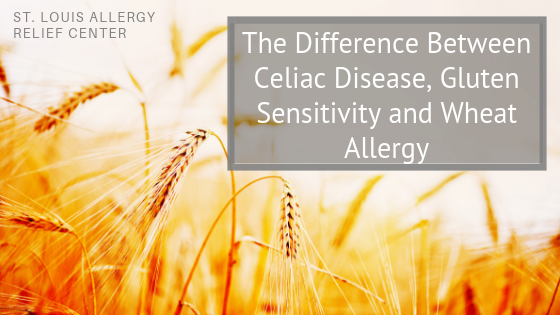The Difference Between Celiac Disease, Gluten Sensitivity and Wheat Allergy

When it comes to understanding the difference in food allergies, there’s a lot to learn. It seems like a daily feature reported in today’s news that allergies and sensitivities are developing at a higher rate than in the past. Therefore, it’s smart to get ahead of the problem and figure out exactly what you’re allergic to. When it comes to Celiac Disease as opposed to gluten or wheat allergies or sensitivities, it’s important to understand the difference. While a gluten-free diet has become trendy in society, for some people it’s a normality and a necessity. Gluten is a combination of proteins found in wheat, barley, rye, and some oats. I’ve broken down the three different conditions below to help you get a better understanding of each.
Celiac Disease
Symptoms
Celiac Disease is an autoimmune disease that can have serious effects on someone’s long term health. The problem is that there are over 300 known symptoms for Celiac Disease, and they can vary from person to person depending on their age and gender. Some people, known as “silent Celiacs”, don’t experience symptoms at all; yet unfortunately ingesting gluten still damages their body asymptomatically. A few of the most common of those 300 symptoms include weight loss or gain, diarrhea and constipation, fatigue, abdominal pain, headaches, joint pain, loss of bone mass, teeth problems, skin rashes, neuropathy, or brain fog. Brain fog usually features memory problems, lack of mental clarity, poor concentration, or an inability to focus. There is no “cure” for Celiac disease. Strict adherence to a completely gluten free diet is essential and the only treatment.
Outcome
If a person with Celiac Disease eats gluten, the villi of their small intestine will break down. Villi are tiny finger-like tentacles that are responsible for absorbing nutrients from food. Having the villi degrade would mean the body wouldn’t be able to absorb the nutrients needed from food. The result is usually malnourishment. It can also cause bone weakening, infertility, lactose or dairy intolerance, and nervous system problems.
Diagnosis
To test for Celiac Disease, a person must already be eating gluten as a regular part of their diet. It is a simple blood test (TTG-IgA Test) that looks for an abnormally high amount of Celiac antibodies in the blood. If found, a small intestine biopsy will be performed which will confirm whether the small intestine villi damage is consistent with Celiac Disease. The only way to treat Celiac Disease is to maintain a strict gluten-free diet to ensure no more damage is done to your villi.
Gluten Sensitivity
Symptoms
Symptoms that occur when someone has a gluten sensitivity are very similar to Celiac Disease, but there is no damage to the intestinal villi. People with gluten sensitivity are still unable to tolerate gluten. The most common symptoms are mental fatigue, physical fatigue, gas, bloating, headaches, and abdominal pain. You can also get numbness in the legs, arms, or fingers and experience brain fog.
Outcome
Gluten sensitivity isn’t an autoimmune disease. It has only recently been recognized as a stand-alone condition by the medical community, and there’s still plenty of debate about the topic. While it isn’t clear yet if a gluten sensitivity can raise your risk of autoimmune conditions; many researchers believe it does. The concern is whether a gluten sensitivity can cause other internal damage to your organs or tissues, even if there isn’t damage to the villi.
Diagnosis
Non-Celiac diagnosis is tested by the process of elimination or food allergy blood testing or Advanced Allergy Therapeutics. Doctors recommend that you get tested both for Celiac Disease and for an allergy to wheat. If those come back negative the next step would be eliminating gluten from your diet completely, and if your symptoms improve on a gluten free diet, then it is likely that you have a gluten sensitivity. A trained physician must be in charge of the process to avoid any misdiagnosis that may occur.
Wheat Allergy
Symptoms
Children or adults who have developed a wheat allergy will likely see symptoms fairly quickly after consuming wheat. These symptoms would be swelling, itching or irritation of the mouth or throat, hives, nasal congestion, headache, difficulty breathing, cramps, diarrhea, or anaphylaxis. Anaphylaxis is a life-threatening symptom that could also bring chest pains, severe difficulty breathing, trouble swallowing, pale blue skin color, dizziness, or fainting.
Outcome
There are several different proteins found in wheat that could cause an allergic reaction, gluten being one of them. People allergic to wheat can usually intake other grains. A wheat allergy is an immune system response. The immune system mistakes wheat as a pathogen and attacks it, causing an allergic reaction. This occurs when antibodies react to proteins such as albumin, globulin, gliadin, or gluten found in wheat. Most wheat allergic reactions are caused by albumin and globulin.
Diagnosis
There are quite a few different tests that can uncover a wheat allergy. The first can be done by keeping a food diary. Write down everything you have eaten in the day and keep track of what may be causing your symptoms. Afterward, eliminate wheat from your diet until the symptoms are gone. Keep track of which foods seem safe and which you should be avoiding. A blood test is another way to prove a wheat allergy. The test detects the number of antibodies in the body for certain foods and would be able to indicate the likelihood of a wheat allergy. The next option is a food challenge test, which must be done by a medical professional. Patients will ingest capsules that contain allergens, first by small doses, which then gradually increase. The individual is monitored for signs or symptoms.
What You Can Do
If you suspect that you have a gluten sensitivity or wheat allergy and have been unsuccessful with your allergy treatments such as eliminating it from your diet and you are looking for something different that works, St. Louis Allergy Relief Center treats allergies holistically with a non-invasive technique. We are an allergy wellness center, specializing only in natural treatments. We specialize in holistic, natural allergy treatments using Advanced Allergy Therapeutics (AAT). AAT treatments are painless and non-invasive, involving no shots or needles, no drugs or herbal supplements, and no avoidance. We provide you with a detailed treatment plan after completing a comprehensive assessment to determine food and environmental stressors that may be triggering allergies or allergy-like symptoms in you or your children.
We also deliver community workshops as well as a free monthly informational workshop on the first Thursday of every month at 5:45 pm in our Chesterfield office. Our free monthly workshop provides the public with information on our unique approach to allergy treatments and includes an opportunity to meet with our patients for a question and answer session. If you are interested in attending one of our free monthly workshops, please call our office at 314-384-9304 to reserve your space.
The three terms used in this article (Celiac Disease, Gluten Sensitivity, Wheat Allergy) are often used interchangeably in conversations but are three completely different conditions. Each one has different symptoms and a different type of plan to treat it. If you think you may have any of the three conditions listed above make sure to talk to your doctor. You should always be diagnosed by a trained professional to get accurate treatment.
Make sure to come to St. Louis Allergy Relief Center if you are suffering from allergies. We are the best natural allergy clinic to help you live your life without suffering from allergies and sensitivities. Visit our website https://stlouisallergyrelief.com/ to learn more or call us at 314-384-9304.
Sources:
https://www.medicalnewstoday.com/articles/174405.php
https://www.verywellhealth.com/what-is-wheat-allergyis-it-the-same-as-celiac-disease-562584
https://www.verywellhealth.com/asymptomatic-or-silent-celiac-disease-563125
https://www.beyondceliac.org/celiac-disease/non-celiac-gluten-sensitivity/
https://celiac.org/about-celiac-disease/what-is-celiac-disease/

